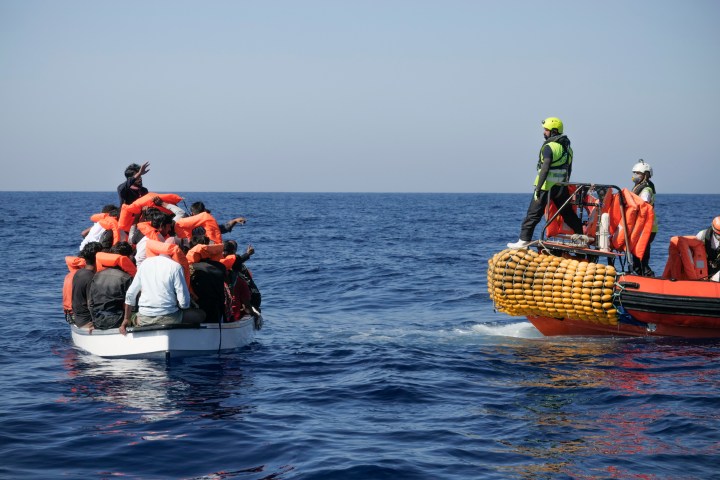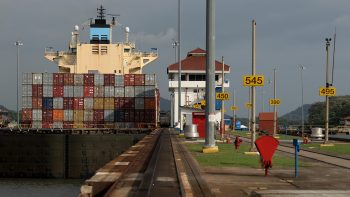
Can Mediterranean search and rescue NGOs survive in 2023?

The job of finding and rescuing people in the Mediterranean Sea has been carried out by charities since E.U. member states stopped their operations in recent years. But with spiraling fuel costs and competition for donations with other humanitarian causes, one NGO is concerned for the future of its funding.
On Nov. 11, surrounded by police, military personnel and customs officials, 230 people disembarked from the Norwegian-flagged charity ship the Ocean Viking in the French military port of Toulon.
Most of the passengers were from Mali, Syria, Bangladesh, Eritrea, Egypt and Pakistan. Among them were 40 unaccompanied minors and four infants. Like many before them, the group had been picked up in the Mediterranean Sea in small boats as they tried to make the treacherous crossing from Libya to Europe.
“We stayed in the sea for two days,” said one survivor from Mali who asked his name be withheld, for fear talking to the press might interfere with his asylum application. “No food, no water, no nothing, and (the Ocean Viking) came to save us.”
But their rescue was not welcomed by all.
Before their arrival in Toulon, a week-long standoff took place between the Ocean Viking and Italian authorities, and then between Italy’s interior minister Matteo Piantedosi and his French counterpart, Gérald Darmanin.
The Central Mediterranean route is one of the most common for people trying to get to Europe outside of traditional immigration channels. By early December 2022, over 93,000 people had crossed this way, according to FRONTEX, the European Union’s border agency. That is a considerable increase over the 63,000 in 2021, but only half the record of over 181,000 in 2016. The International Organization for Migration estimates that, at an absolute minimum, at least 20,000 people have died trying to cross this way since 2014.
The majority of people who make it across the Central Mediterranean arrive in Italy, which has been a major political issue in Italy for decades. In late October 2022, Giorgia Meloni was appointed Prime Minister of Italy. The leader of the right-wing Brothers of Italy party, Meloni was elected partially on her campaign promise to reduce such immigration. Her coalition partner, Deputy Prime Minister Matteo Salvini of the Lega Nord party, was more explicit, with “No Disembarkations” featuring prominently in campaign material.
It was no surprise, then, that just days after the new Italian government was formed, Interior minister Matteo Piantedosi issued a decree effectively barring charity rescue ships from disembarking in Italian ports.
On the day of the decree, the Ocean Viking had already begun sending requests to European maritime coordination centers for a safe port to disembark their passengers. Italy steadfastly refused the requests, and the Ocean Viking would send 46 requests in total before France intervened, clearing the way for the passengers to be disembarked in Toulon.
The French interior minister called Italy’s behavior “unacceptable” and suspended an agreement to resettle 3,500 refugees from Italy. The ensuing diplomatic spat was eventually resolved, but the episode has cast a shadow over the future of search and rescue operations by charities in the Mediterranean.
The Ocean Viking’s operations are run jointly by the International Red Cross and the humanitarian organization SOS Méditerranée. The vessel, like other NGO-run ships, fills the gap left by Italian authorities, who ceased their own search and rescue operations in 2014, citing costs of around $10,000,000 per month and a lack of support from other E.U. member states.
The Ocean Viking’s own running costs are typically around $14,000 per day. With spiraling fuel prices triggered by conflict in Ukraine, this year the budget is expected to be at least 25% higher, according to Sophie Beau, co-founder and general manager of SOS Méditerranée.
The war in Ukraine has presented more challenges as well, potentially diverting Europeans’ generosity to a more visible cause. Over half of Ocean Viking’s operations come from private donations. SOS Méditerranée took in around $10,000,000 in funding in 2021, 56% of that coming from private citizens.
“It’s a strength, and it’s a fragility as well,” Beau said. “A year like this, when there is strong pressure from humanitarian crises such as Ukraine, people will donate a lot for this new humanitarian crisis, and it will be more difficult for us to sustain our own fundraising.”
At the same time, with the cost of living increasing across Europe, Beau is concerned people won’t be able to give as much as in previous years.
“This is a big, big worry we have,” she said. “It’s a really difficult situation for us this year.”
Compounding the problem is the additional operating costs if Italy continues to bar boats such as the Ocean Viking from its ports. Two other charity-run ships were recently given permission to disembark in Italy. Nonetheless, the mere prospect of having to continue to operate from France, which is considerably further from the Ocean Viking’s area of operations, threatens to push costs over the limit of what the NGO can afford.
“The financial situation of any NGO (would not allow it) as a possibility,” said SOS Méditerranée’s director of operations Xavier Lauth.
There’s a lot happening in the world. Through it all, Marketplace is here for you.
You rely on Marketplace to break down the world’s events and tell you how it affects you in a fact-based, approachable way. We rely on your financial support to keep making that possible.
Your donation today powers the independent journalism that you rely on. For just $5/month, you can help sustain Marketplace so we can keep reporting on the things that matter to you.

















